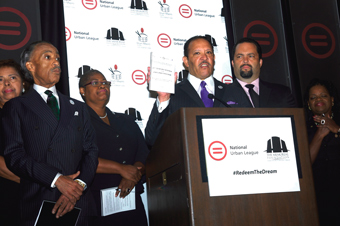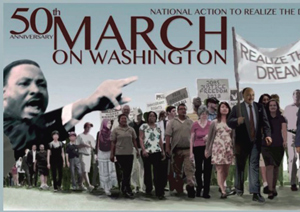Talk of unity and a common agenda
By Richard B. Muhammad -Editor- | Last updated: Aug 28, 2013 - 8:21:19 AMWhat's your opinion on this article?

Marc Morial of the Urban league flanked by Rev Sharpton Melanie Campbell and Ben Jealous announces 21st Century Agenda for Jobs. Photo: Richard B. Muhammad
|
The broad areas were unveiled by “Big 4” conveners Marc Morial of the National Urban League, Rev. Al Sharpton of the National Action Network, Benjamin Jealous of the NAACP and Melanie Campbell of the National Coalition on Black Civic Participation, at an Aug. 23 session at the Grand Hyatt hotel.
The “urgent domestic goals” included efforts to “achieve economic parity for African Americans; promote equity in educational opportunity; protect and defend voting rights; promote a healthier nation by eliminating healthcare disparities and achieve comprehensive criminal justice system reform.”
The “21st Century Agenda for Jobs and Freedom” was the result of meetings last December and in January, said conveners. Participants included nearly 60 leading civil rights, social justice, business and community leaders, they added. Besides face-to-face meetings were numerous conference calls, according to Mr. Morial.
“It’s different because, candidly, we have allowed the sometimes inaccurate perception that we cannot unify our voices to get in the way,” he said.

|
“We decided instead of joining the chorus of cynics and complainers, that we would create a new course and that would be the course of unity, cooperation and collaboration.”
Fifty years later, there must be a continuation around an agenda not marching or protesting for its own sake, he said.
The agenda offers a foundation and statement of principle that hopefully others will embrace and help craft strategies to accomplish the goals, said the Urban League CEO.
The 1963 march had goals, which included fair housing and voting rights, he added.
“Fifty years after the ‘I Have A Dream’ speech, there is still too much business left for us to do,” said Mr. Jealous of the NAACP.
He cited a litany of victories in the midst of struggle: passage of a Dream Act for immigrant youth, gun safety, early voting, same day voter registration, marriage equality laws, and ending the death penalty in Maryland. In New York, he continued, the city council overrode a mayoral veto of a bill designed to halt racial profiling by police.
Common ground was found with the GOP in Georgia and Tea Party supporters in Texas to reform prisons and downsize penal institutions, he said.
There is still the fight against voter i.d. laws and other changes seen as efforts to suppress voting in places like North Carolina and Florida, said Mr. Jealous.
Mass incarceration is perhaps the biggest issue, despite problems in education and unemployment, he said. In too many regions Republican governors have been more willing to downsize prisons than Democratic governors, “that needs to change,” said the head of the nation’s oldest civil rights group.
Melanie Campbell stressed voting rights. Destruction of voting rights keeps the have-nots without and allows for erosions of other liberties, she said. The 5-point agenda provides a focus for what needs to be done today and ensure progress 50 years from now, Ms. Campbell added.
Fifty years later Blacks are “confronted with some of the same problems and new problems,” observed Rev. Sharpton.
Black unemployment remains double the White rate, alongside yesterday’s no right to vote and today’s “new polished form of voter suppression,” he noted.
Mass incarceration is at crisis levels and Congress refuses to pass a jobs bill, said Rev. Sharpton describing external challenges to progress. He also spoke to internal challenges:
“The reason we have not made the progress we needed is we’ve been too disconnected,” said the MSNBC TV host and Radio One talk show host.
“We’ve been too worried who would get the credit rather than fighting the fight,” he said.
Yet with talk of common ground, new unity, and mutual respect there was a missing voice. A question about his absence came when the day-long session was opened to audience participation.
“One leader that seems to be remotely absent, in the march this year is a leader who has been incredibly effective … and that’s Min Louis Farrakhan,” said Byron Engall from Uptown magazine, when he stepped up to the microphone. There was hush over the crowd and then applause.
“When Minister Farrakhan convened the Million Man March and Millions More Movement, it was seen as operational unity for all perspectives,” said Dr. Ron Daniels of the Institute for the Black World 21st Century. “I don’t think these leaders make any pretense but that this (gathering) is of a certain historical tendency, it is the King-integrationist tendency.” Dr. Daniels didn’t think it was unusual or unexpected that the Nation of Islam minister was not invited.
Dr. Daniels added that if he or others had organized the gathering, an invite to Min. Farrakhan would not have been an issue. “We think there is enough room at the table,” he said. Leonard Dunston, however, former president of the National Association of Black Social Workers, called the Minister’s absence “offensive.” “Here’s a man who was able to mobilize 2 million Black men …for him not to be invited is a miscarriage of justice to be perfectly honest with you.” he said.
INSIDE STORIES AND REVIEWS
-
-
About Harriett ... and the Negro Hollywood Road Show
By Rabiah Muhammad, Guest Columnist » Full Story -
Skepticism greets Jay-Z, NFL talk of inspiring change
By Bryan 18X Crawford and Richard B. Muhammad The Final Call Newspaper @TheFinalCall » Full Story -
The painful problem of Black girls and suicide
By Charlene Muhammad -National Correspondent- » Full Story -
Exploitation of Innocence - Report: Perceptions, policies hurting Black girls
By Charlene Muhammad -National Correspondent- » Full Story -
Big Ballin: Big ideas fuel a father’s Big Baller Brand and brash business sense
By Bryan Crawford -Contributing Writer- » Full Story






 Click Here Stay Connected!
Click Here Stay Connected!








